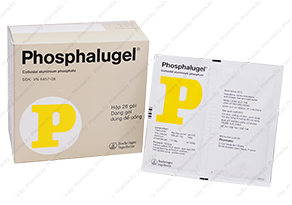
Phosphalugel is used for the relief of heartburn, sour stomach, and peptic ulcer pain and to promote the healing of peptic ulcers. Usual dosage is 20-40 mg per dose, 2-3 times per day but no more than 120 mg in 24 hrs.
No significant side effects are known. Aluminum on its own could cause muscle weakness, bone pain, osteoporosis, constipation (like other alluminum-containing antacids counteracted by Magnesium), delayed growth in children, altered mental abilities, dementia and seizures after prolonged accumulation. May be associated with Pyrexia, Ulcers, Asthenia, Anemia.
Antacids with alginic acid (such as Gaviscon that contains aluminum hydroxide and magnesium carbonate) contain a foaming agent that floats on top of the stomach contents. This may help keep stomach juices from coming in contact with the esophagus. Antacids that contain simethicone (such as Maalox Anti-Gas or Mylanta Gas - in addition to Aluminum hydroxide and Magnesium hydroxide) may break down gas bubbles in the stomach. This may help reduce burping that might push stomach acid into the esophagus.
Aluminum ions in antacids like Aludrox, Phosphalugel and Simeco are bound to sialic acid residues in mucus glycoproteins, thus retarding the transit of these antacids through both the AS and the real stomach and prolonging their activity in both situations. When the Al:Mg ratio is low or when the amount of antacid salts is large, aluminum ions tend to be buried in complexes, giving them less chance to interact with gastric mucus, so they transit the stomach more quickly.
